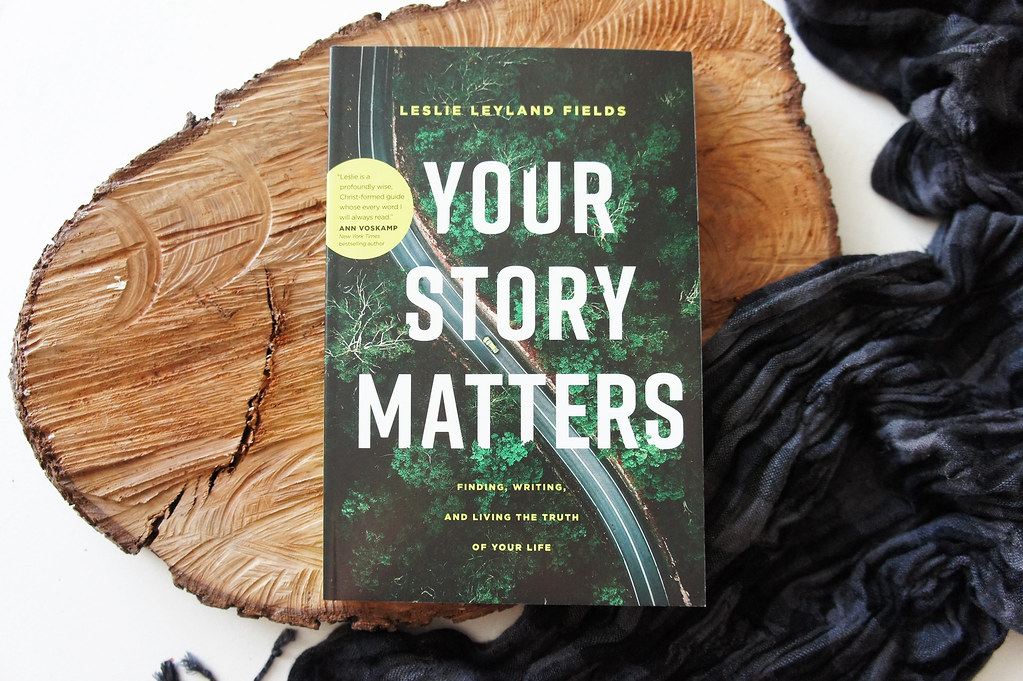Leslie Leyland Fields was not only my first writing mentor: She continues to mentor me with the way she actually lives her life and then shapes it into an unforgettable story that gives sojourners hope—and gives God all the glory. She is a profoundly wise, Christ-formed guide whose every word I will always read. Why? Because she was there at the very beginning of my journey as an author. Leslie is a profound teacher of story. It’s a grace to welcome her to the farm’s front porch today …
guest post by Leslie Leyland Fields
A few years ago, I was standing on a stage, a mic at my throat, facing a sober audience.
Just a few days before, a man had pulled out twenty-three guns and shot into a crowd of twenty-two thousand.
Fifty-nine were killed, hundreds more wounded. Most of us remember that day, though it blurs with so many other hostilities and attacks around the world that visit us on our screens each day.
This was a writing conference. Each person had come to learn and to be inspired.
I had planned to say some of what I’ve written in my book:
Write your story for you, for your family. Write your story to name the world and give it back. Write your story to wrestle God. Write your stories to pass on the comfort you have received in all of your distress. Write your stories to attend to what God attends to. Write your story to pass on all you’ve seen and heard of the sacred in this world.
All of this was still true. I believed every word. But that day, I wanted more.
I wanted to hand out bulletproof vests instead of pens. I wanted to hand out shields and swords instead of speaking words into the air about writing words on the page.
Never had I felt so shaken, so helpless. What good were all these words? Can words stop bullets and end violence?










But then I remembered that in His own violent world and time, Jesus didn’t call out the military or teach self-defense classes or hand out swords, though all of this was warranted.
Instead, He told a story.
“A man was on his way from Jerusalem to Jericho . . .,” about a man who was violently attacked, robbed, and left for dead. Who was then ignored, despite his need, by the very ones—a lawyer, a priest—who should have rescued him.
The one man who stopped to bind his wounds and to nurse him to strength and health was a man Jesus’ listeners despised. A man of the wrong lineage, the wrong ethnicity and religion.
Jesus just gave them that story.
Maybe He used his hands and acted it out a little as He spoke, but He just gave them a story. Words that show us what it looks like to be blind, what it looks like to see beyond political and religious labels, what it looks like to be a neighbor, what it looks like to love.
So I did that too.
I stood there and told that story, with a few changes: a Democrat passed by, a pastor passed by, a Republican passed by, but a liberal stopped and bound his wounds. Or a libertarian stopped and bound his wounds. I moved the labels around.
I remembered that stories can do what guns and shields cannot: They can move us beyond affiliations, under the skin of our neighbors, even into the hearts of those we think are our enemies whom we are to love because they, too, are made in the image of God. Every one of us—carrying the image of God.
But I couldn’t stop with that parable.
Because after that story we might think, Okay, we need uplifting, hopeful stories that show love and mercy, where all turns out happy and well.
But do we know how hard that story was to hear? It rattled and shook up the entire social order. (Wait. The social outcast is the good guy? The super religious are the bad guys? We have to take care of strangers?)
Don’t we know Jesus did this a lot? Every story Jesus told was riveting, challenging, new.
He valued people no one else valued: the lepers, the blind, the insane. He had deep friendships with women. He was scary in the breadth of His love and forgiveness.
Sometimes in our comfort and security, we forget: The good news He came to speak is not safe, not for anyone.
The gospel’s revolutionary message is not safe, but it is true. And it is beautiful, but it’s a beauty that must cut to heal.
If we really want to offer healing to this cracked-up world, our stories must do as Jesus’s did: tell the whole truth about this human existence.
Yes, about its goodness and hope as well as its tragedy, absurdity, and folly. And, like Jesus, we need to tell these stories with original words so our readers’ ears and eyes will stay open and awake.
What will happen then, when your words go out, near or far, to many or a few? Who can know what will happen?
One summer, I roamed the hills and grass of our island in Alaska with a clutch of papers in my hands—a first draft of a book from a young woman in Canada.
We wrote back and forth about her poetic words, about narrative arc, about story. Her words were piercingly beautiful, and I hoped she would garner a large readership, but who can guarantee such a thing? I had written seven books by then and knew the ropes.
Solemnly, I prepared her for the reality of a first release, which often doesn’t sell well.
A year later, Ann Voskamp’s One Thousand Gifts launched into the world, selling a million copies within the first two years.
But fame and fortune are uncommon visitors for most of us.
I know hundreds of writers, and only a few can claim even a passing visit with these handsome suitors whom we imagine are hovering around our doorbell, waiting for the moment our brilliant words take flight.
I am not immune. I confess to occasional pangs of jealousy toward the twelve authors in the world selling a bazillion books. I think, in a temporary swoon, How easy their writing lives must be!
But then I remember from my own modest shots of fame that every burst of attention brings greater responsibilities, not fewer.
Another friend landed a spot on the New York Times bestseller list. His agent, readers, and global fan base now hold their collective breath for his next book. How can he write with so many others now to heed and please?
So enjoy the quiet. Your obscurity as a writer right now is a gift.
Keep freely pursuing the truth of your life.
Keep using “that one talent which is death to hide,” as John Milton writes.
If you’re doing any of this now, you’re already famous.
Your Story Matters presents the dynamic and spiritually formative writing process that award-winning author Leslie Leyland Fields has been using and teaching for decades. Practical and inspiring, this book will help you remember, reflect, and ultimately transform your life through the messy and beautiful process of story.
Your story is bigger than you know. No matter who you are or what your age and stage of life, your story matters. From the tiniest details to the most dramatic events, your story is sacred and worthy of attention.
Whether your goal is healing from your past, legacy for future generations, or publishing your first book, you will sojourn together with Leslie and a host of others. In the pages you’ll soon be writing from your own life, you’ll discover new spiritual truths, reclaim the past, share hope, and pass on your own extraordinary legacy.
A video curriculum, Your Story for His Glory, recorded on the Alaskan island that Leslie Leyland Fields calls home, is also available as a companion to the book. The curriculum features one of Leslie’s wilderness writing retreats with several students and guest lecturer, bestselling author Ann Voskamp.
Your story matters. It’s time to find and tell the truth of your story. It will be a compelling story. A crafted story. A healing story. A bigger story. And in the finding and telling of this story, you’ll live it too. Leslie is a profoundly wise, Christ-formed guide whose every word I will always read.
[ Our humble thanks to Tyndale for their partnership in today’s devotion ]








